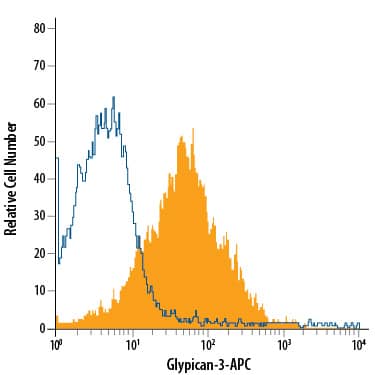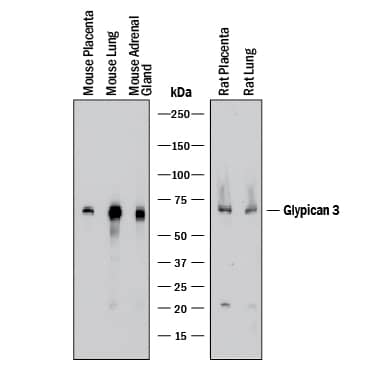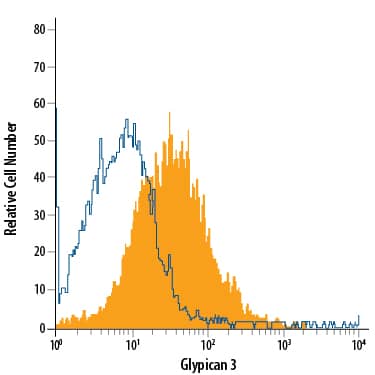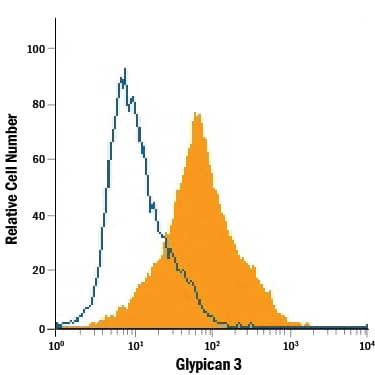Glypican 3 Products
The glypicans (GPC) constitute a family of glycosylphosphatidylinositol (GPI)-anchored, heparan sulfate proteoglycans. Six members of this family have been identified in mammals (GPC1-GPC6). All glypican core proteins contain an N-terminal signal peptide, a large globular cysteine-rich domain (CRD) with 14 invariant cysteine residues, a stalk-like region containing the heparan sulfate attachment sites, and a C-terminal GPI attachment site.
Mutations in Glypican 3 cause a rare disorder in humans, Simpson-Golabi-Behmel Syndrome, which is characterized by pre- and postnatal overgrowth of multiple tissues and organs and an increased risk for developing embryonic tumors. These features are also present in the mouse knock-out of Glypican 3 indicating that Glypican 3 regulates cell survival and inhibits cell proliferation during development. Glypican 3 has been implicated in regulating many different signaling pathways including: IGF, FGF, BMP and Wnt. An endoproteolytic processing of Glypican 3 by proprotein convertases is required for the modulation of Wnt signaling. Direct interaction of Glypican 3 with FGF-basic has been observed and is mediated by the heparan sulfate chains.
71 results for "Glypican 3" in Products
71 results for "Glypican 3" in Products
Glypican 3 Products
The glypicans (GPC) constitute a family of glycosylphosphatidylinositol (GPI)-anchored, heparan sulfate proteoglycans. Six members of this family have been identified in mammals (GPC1-GPC6). All glypican core proteins contain an N-terminal signal peptide, a large globular cysteine-rich domain (CRD) with 14 invariant cysteine residues, a stalk-like region containing the heparan sulfate attachment sites, and a C-terminal GPI attachment site.
Mutations in Glypican 3 cause a rare disorder in humans, Simpson-Golabi-Behmel Syndrome, which is characterized by pre- and postnatal overgrowth of multiple tissues and organs and an increased risk for developing embryonic tumors. These features are also present in the mouse knock-out of Glypican 3 indicating that Glypican 3 regulates cell survival and inhibits cell proliferation during development. Glypican 3 has been implicated in regulating many different signaling pathways including: IGF, FGF, BMP and Wnt. An endoproteolytic processing of Glypican 3 by proprotein convertases is required for the modulation of Wnt signaling. Direct interaction of Glypican 3 with FGF-basic has been observed and is mediated by the heparan sulfate chains.
| Reactivity: | Human |
| Details: | Mouse IgG2a Monoclonal Clone #307801 |
| Applications: | Flow |
| Reactivity: | Human |
| Details: | Mouse IgG2a Monoclonal Clone #307801 |
| Applications: | Flow |
| Reactivity: | Human |
| Details: | Mouse IgG2a Monoclonal Clone #307801 |
| Applications: | Flow |
| Reactivity: | Human |
| Details: | Mouse IgG2a Monoclonal Clone #307801 |
| Applications: | Flow |
| Reactivity: | Human |
| Details: | Mouse IgG2B Monoclonal Clone #CL12711 |
| Applications: | IHC |
| Reactivity: | Human |
| Details: | Mouse IgG2a Monoclonal Clone #307801 |
| Applications: | Flow |
| Reactivity: | Human, Mouse, Rat |
| Details: | Mouse IgG2A Monoclonal Clone #307801 |
| Applications: | WB, ICC/IF, Flow, CyTOF-ready |
| Reactivity: | Human, Mouse, Rat |
| Details: | Mouse IgG2A Monoclonal Clone #307801 |
| Applications: | WB, ICC/IF, Flow, CyTOF-ready |
| Reactivity: | Human |
| Details: | Mouse IgG1 kappa Monoclonal Clone #1G12 |
| Applications: | IHC, WB, ICC/IF, Flow, CyTOF-ready |
| Reactivity: | Human |
| Details: | Mouse IgG1 kappa Monoclonal Clone #SPM595 |
| Applications: | IHC, ICC/IF, Flow, CyTOF-ready |
| Reactivity: | Human, Rat |
| Details: | Mouse IgG1 kappa Monoclonal Clone #rGPC3/863 |
| Applications: | IHC, ICC/IF, Flow, CyTOF-ready, MA |
| Reactivity: | Human, Rat |
| Details: | Mouse IgG1 kappa Monoclonal Clone #GPC3/863 |
| Applications: | IHC, ICC/IF, Flow, CyTOF-ready |
| Reactivity: | Human |
| Details: | Mouse IgG1 kappa Monoclonal Clone #SPM595 |
| Applications: | IHC, ICC/IF, Flow, CyTOF-ready |
| Reactivity: | Human, Rat |
| Details: | Mouse IgG1 kappa Monoclonal Clone #rGPC3/863 |
| Applications: | IHC, ICC/IF, Flow, CyTOF-ready, MA |
| Reactivity: | Human, Rat |
| Details: | Mouse IgG1 kappa Monoclonal Clone #rGPC3/863 |
| Applications: | IHC, ICC/IF, Flow, CyTOF-ready, MA |
| Reactivity: | Human |
| Details: | Mouse IgG1 kappa Monoclonal Clone #SPM595 |
| Applications: | IHC, ICC/IF, Flow, CyTOF-ready |
| Reactivity: | Human, Rat |
| Details: | Mouse IgG1 kappa Monoclonal Clone #GPC3/863 |
| Applications: | IHC, ICC/IF, Flow, CyTOF-ready |
| Reactivity: | Human, Rat |
| Details: | Mouse IgG1 kappa Monoclonal Clone #rGPC3/863 |
| Applications: | IHC, ICC/IF, Flow, CyTOF-ready, MA |
| Reactivity: | Human |
| Details: | Mouse IgG2B Monoclonal Clone #CL12711 |
| Applications: | IHC |
| Reactivity: | Human |
| Details: | Mouse IgG2B Monoclonal Clone #CL12711 |
| Applications: | IHC |
| Reactivity: | Human |
| Details: | Mouse IgG2B Monoclonal Clone #CL12711 |
| Applications: | IHC |
| Reactivity: | Human |
| Details: | Mouse IgG2a Monoclonal Clone #307801 |
| Applications: | Flow |
| Reactivity: | Human, Mouse, Rat |
| Details: | Mouse IgG2a Monoclonal Clone #307801 |
| Applications: | WB, Flow, CyTOF-ready, ICC |
| Reactivity: | Human |
| Details: | Mouse IgG2a Monoclonal Clone #307801 |
| Applications: | Flow |
| Reactivity: | Human |
| Details: | Mouse IgG2a Monoclonal Clone #307801 |
| Applications: | Flow |


![Immunohistochemistry-Paraffin: Glypican 3 Antibody (CL12711) [NBP3-18542] Immunohistochemistry-Paraffin: Glypican 3 Antibody (CL12711) [NBP3-18542]](https://resources.bio-techne.com/images/products/Glypican-3-Antibody-CL12711-Immunohistochemistry-Paraffin-NBP3-18542-img0001.jpg)




